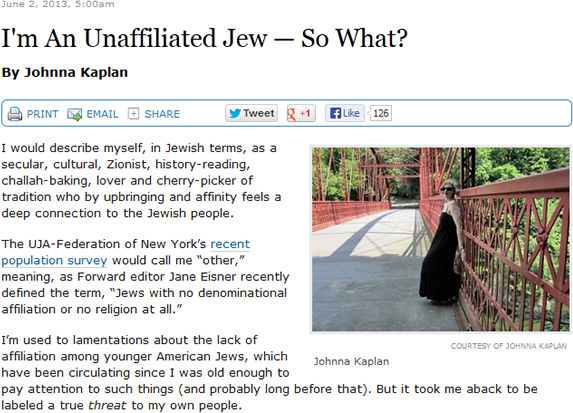 I think it’s worth pausing for a moment to ask why the above photo (originally found here), recently used as the cover image on the Culture on the Edge facebook page, “works.” Given the theoretical goals of this research group (more on that under Identity), why this image of a young Tibetan Buddhist monk (or at least someone dressed up like one, of course) drinking so casually from a pop bottle. What do we assume it “says” and about whom? Continue reading “Kids Drink Pop, So What?”
I think it’s worth pausing for a moment to ask why the above photo (originally found here), recently used as the cover image on the Culture on the Edge facebook page, “works.” Given the theoretical goals of this research group (more on that under Identity), why this image of a young Tibetan Buddhist monk (or at least someone dressed up like one, of course) drinking so casually from a pop bottle. What do we assume it “says” and about whom? Continue reading “Kids Drink Pop, So What?”
The Other Shoe Drops
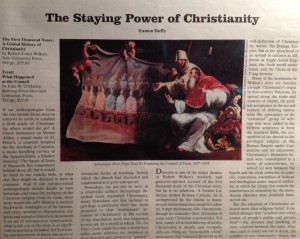 In the same issue of The New York Review of Books that I cited elsewhere (the June 20, 2013 issue), there appears a review essay on two new books on the history of Christianity. Written by the Cambridge University historian, Eamon Duffy, and entitled “The Staying Power of Christianity,” it tackles Robert Wilken’s The First Thousand Years: A Global History of Christianity and John O’ Malley’s Trent: What Happened at the Council. For those interested in bringing more nuanced social theory to the study of religion, Duffy’s opening lines promise much: “If an anthropologist from the star system Sirius were to teleport to earth to conduct a field study of Christianity, where would she go?” What follows is a quick list of several different sites–e.g., a Greek monastery on Mount Athos, a papal mass in St. Peters, a Pentecostal snake-handling service, a Quaker meeting house, etc.–that makes plain that the notion of a homogenous thing called Christianity is hardly a given for many current scholars. “History is written backwards, hindsight is of its essence,” Duffy writes in concluding his introductory paragraph, “and every attempt to characterize any great and complex historical movement is an act of retrospective construction: what is left out of the story is just as significant as anything included.” Continue reading “The Other Shoe Drops”
In the same issue of The New York Review of Books that I cited elsewhere (the June 20, 2013 issue), there appears a review essay on two new books on the history of Christianity. Written by the Cambridge University historian, Eamon Duffy, and entitled “The Staying Power of Christianity,” it tackles Robert Wilken’s The First Thousand Years: A Global History of Christianity and John O’ Malley’s Trent: What Happened at the Council. For those interested in bringing more nuanced social theory to the study of religion, Duffy’s opening lines promise much: “If an anthropologist from the star system Sirius were to teleport to earth to conduct a field study of Christianity, where would she go?” What follows is a quick list of several different sites–e.g., a Greek monastery on Mount Athos, a papal mass in St. Peters, a Pentecostal snake-handling service, a Quaker meeting house, etc.–that makes plain that the notion of a homogenous thing called Christianity is hardly a given for many current scholars. “History is written backwards, hindsight is of its essence,” Duffy writes in concluding his introductory paragraph, “and every attempt to characterize any great and complex historical movement is an act of retrospective construction: what is left out of the story is just as significant as anything included.” Continue reading “The Other Shoe Drops”
What is a Andy Warhol?
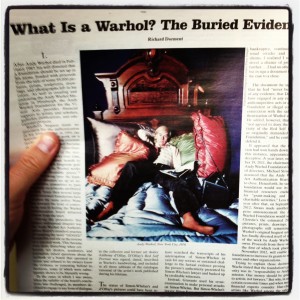 Those interested in how discourses on authenticity work to–as this article states it–stabilize an economy (of any form of signification, be it meaning or money) should consider the current issue (June 20, 2013, vol. 60/11) of The New York Review of Books and its article “What is a Andy Warhol”–an analysis of the goings on of the now defunct, but once powerful and always controversial, Andy Warhol Authentication Board.
Those interested in how discourses on authenticity work to–as this article states it–stabilize an economy (of any form of signification, be it meaning or money) should consider the current issue (June 20, 2013, vol. 60/11) of The New York Review of Books and its article “What is a Andy Warhol”–an analysis of the goings on of the now defunct, but once powerful and always controversial, Andy Warhol Authentication Board.
Biblical Literates
 That was the headline of a Huffington Post article yesterday, referring to an op-ed piece in the Des Moines Register, co-authored by three Iowa scholars of religion, all with specialties in biblical studies. The newspaper article they wrote opened by stating:
That was the headline of a Huffington Post article yesterday, referring to an op-ed piece in the Des Moines Register, co-authored by three Iowa scholars of religion, all with specialties in biblical studies. The newspaper article they wrote opened by stating:
Religious Experience
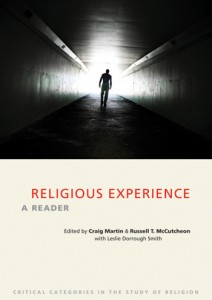 Craig Martin and Russell McCutcheon recently co-edited an anthology on religious experience for Acumen Publishing of the UK–or better put, a collection of critical readings that takes the discourse on religious experience as its object of study, inasmuch as all scholars have to study are claims of experience, regardless the sort. And Leslie Dorrough Smith contributed the critical introductions to each reading.
Craig Martin and Russell McCutcheon recently co-edited an anthology on religious experience for Acumen Publishing of the UK–or better put, a collection of critical readings that takes the discourse on religious experience as its object of study, inasmuch as all scholars have to study are claims of experience, regardless the sort. And Leslie Dorrough Smith contributed the critical introductions to each reading.
That Ain’t The Queen’s English
One of the premises of Culture on the Edge is that an implicit, untheorized norm is still presupposed, and its legitimacy is thereby reproduced rather than being historicized, despite many scholars’ recent efforts to develop what they see to be more nuanced, historically sensitive, and situationally specific approaches to identity studies. For it is not uncommon to find seemingly anti-essentialist scholars now studying various identities in terms of their hybridity, seeing them as creoles, studying how diaspora movements have traveled and changed, and documenting the complexity of syncretism–developments understood as important improvements on what are now seen to be previous generations’ far too simplistic studies of social life. After all, as important a an early sociologist as Emile Durkheim seems merely to have understood “society” to be a homogenous, undifferentiated unit. Continue reading “That Ain’t The Queen’s English”
Cherry Pickers
On the weekend a Facebook friend posted a link to an interesting blog post on contests over modern Jewish identity. It opened as follows:
Silencing the Past
Michel-Rolph Trouillot, Silencing the Past: Power and the Production of History (Beacon Press, 1995).
A practical series of case studies (e.g., the Hatian Revolution) by the late (d. 2012) University of Chicago Professor of Anthropology/Social Sciences on how discourses on the past are not about recovering or remembering enduring items from history so much as deploying techniques in the present continually to limit what in the archives will count as the past. As such, how does one write a history of the forgotten, “a history of the impossible”–a genealogy of the choices that led to this or that narrative of “the past.”
The Sacred is the Profane
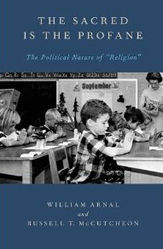 Russell McCutcheon, along with his co-author William Arnal, just published a collection of essays entitled The Sacred is the Profane: The Political Nature of “Religion” with Oxford University Press. The book presses forward the thesis that the category “religion” is one of our own group’s ways of classifying, sorting, and thereby understanding the world around us rather than, as is most often thought, being a natural and thus permanent feature of that world.
Russell McCutcheon, along with his co-author William Arnal, just published a collection of essays entitled The Sacred is the Profane: The Political Nature of “Religion” with Oxford University Press. The book presses forward the thesis that the category “religion” is one of our own group’s ways of classifying, sorting, and thereby understanding the world around us rather than, as is most often thought, being a natural and thus permanent feature of that world.
Culture on the Edge Podcast
 During its working session in Chicago, in November 2012, the members of Culture on the Edge (pictured below) took some time to record a conversation on identity creation and its study, for The Religious Studies Project (RSP)–a series of podcasts created and maintained by UK grad students that is devoted to the work of scholars of religion from around the world.
During its working session in Chicago, in November 2012, the members of Culture on the Edge (pictured below) took some time to record a conversation on identity creation and its study, for The Religious Studies Project (RSP)–a series of podcasts created and maintained by UK grad students that is devoted to the work of scholars of religion from around the world.
Click here to listen to our conversation.
Apart from thanking RSP’s Christopher Cotter and David Robertson for their interest in our work, we would like to thank Andie Alexander, then a student in the Department of Religious Studies at the University of Alabama, for assisting with the technology, and also thank the Department for supporting the group.)



